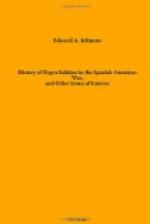I have heerd o’ lots o’ sermons,
An’ I’ve heerd
o’ lots o’ prayers;
An’ I’ve listened to some
singin’
Dat has tuck me up de stairs
Of de Glory Lan’ an’ set me
Jes’ below de Mahster’s
th’one,
An’ have lef my haht a singin’
In a happy aftah-tone.
But dem wu’s so sweetly murmured
Seem to tech de softes’
spot,
When my mammy ses de blessin’.
An de co’n pone’s
hot.
—Taken from the Literary Digest.
DISFRANCHISEMENT OF COLORED VOTERS.
While the Northern and Western portions of the United States were paying tributes to the valor of the Negro soldiers who fought for the flag in Cuba, the most intense feeling ever witnessed, was brewing in some sections of the South-notably in the North Carolina Legislature against the rights and privileges of Negro citizenship, which culminated in the passage of a “Jim Crow” car law, and an act to amend the Constitution so as to disfranchise the colored voters. It was noticeable, however, that although the “Jim Crow Car” law got through that body in triumph, yet the “Jim Crow Bed” law, which made it a felony for whites and colored to cohabit together DID NOT PASS.
[Illustration: FILIPINO LADY OF MANILA.]
The Washington Post, which cannot be rated as generally partial to the colored citizens of the Union, and which is especially vicious in its attacks on the colored soldiers, has the following to say as to the proposed North Carolina amendment, which is so well said that we insert the same in full as an indication to our people that justice is not yet dead—though seemingly tardy:
SUFFRAGE IN NORTH CAROLINA.
(Washington Post, Feb. 20, 1899.)
The amendment to the Constitution of North Carolina, which has for its object the limitation of the suffrage in the State, appears to have been modeled on the new Louisiana laws and operate a gross oppression and injustice. It is easy to see that the amendment is not intended to disfranchise the ignorant, but to stop short with the Negro; to deny to the illiterate black man the right of access to the ballot box and yet to leave the way wide open to the equally illiterate whites. In our opinion the policy thus indicated is both dangerous and unjust. We expressed the same opinion in connection with the Louisiana laws, and we see no reason to amend our views in the case of North Carolina. The proposed arrangement is wicked. It will not bear the test of intelligent and impartial examination. We believe in this case, as in that of Louisiana, that the Federal Constitution has been violated, and we hope that the people of North Carolina will repudiate the blunder at the polls.




